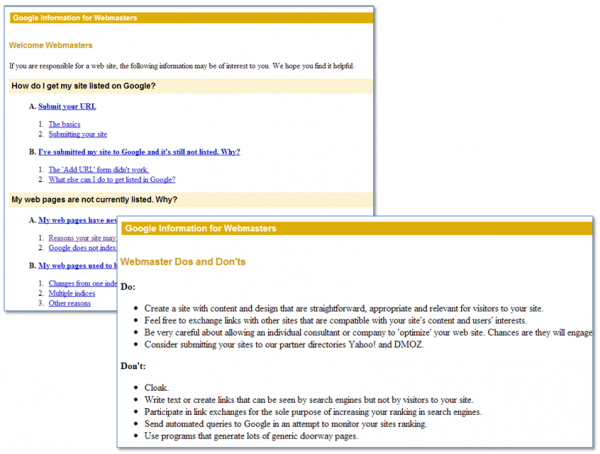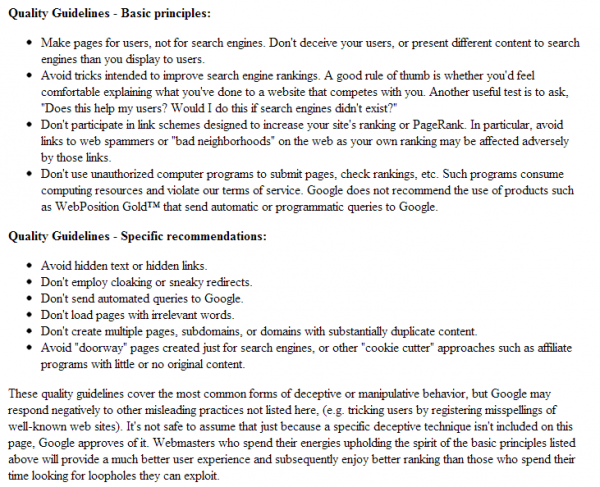Google Updates Their Webmaster Guidelines To Include Details On Rich Snippet Abuse
Google has published “information for webmasters” as least as far back as 2001. The original information included “do’s and don’ts” and “fact and fiction”. In 2003, Google expanded this information to include a specific set of “webmaster guidelines”: In 2006, www.google.com/webmasters became Google Webmaster Central, and the information for webmasters became a complete help […]
Google has published “information for webmasters” as least as far back as 2001. The original information included “do’s and don’ts” and “fact and fiction”.
In 2003, Google expanded this information to include a specific set of “webmaster guidelines”:
In 2006, www.google.com/webmasters became Google Webmaster Central, and the information for webmasters became a complete help center with lots of details and explanations.
Google has continued to refine and evolve their information for site owners over the years, both to provide information about what’s new and to provide further clarity. This week, they’ve updated their guidelines and help center again.
The main change was to add guidelines around rich snippets.
If the rich snippets markup on a page is spammy, misleading, or otherwise abusive, our algorithms are much more likely to ignore the markup and render a text-only snippet. Keep in mind that, while rich snippets are generated algorithmically, we do reserve the right to take manual action (e.g., disable rich snippets for a specific site) in cases where we see actions that hurt the experience for our users.
Examples and details were added to several of the existing guidelines. For instance, the detail about link schemes had these examples added:
- Text advertisements that pass PageRank
- Links that are inserted into articles with little coherence, for example:
most people sleep at night. you can buy cheap blankets at shops. a blanket keeps you warm at night. you can also buy a wholesale heater. It produces more warmth and you can just turn it off in summer when you are going on france vacation.
- Low-quality directory or bookmark site links
- Links embedded in widgets that are distributed across various sites, for example:
Visitors to this page: 1,472
car insurance
- Widely distributed links in the footers of various sites
- Forum comments with optimized links in the post or signature, for example:
Thanks, that’s great info!
– Paul
paul’s pizza san diego pizza best pizza san diego
While the guidelines have been updated, the spirit behind them hasn’t changed. Write great content for your audiences and don’t try to manipulate search engine algorithms.
Contributing authors are invited to create content for Search Engine Land and are chosen for their expertise and contribution to the search community. Our contributors work under the oversight of the editorial staff and contributions are checked for quality and relevance to our readers. The opinions they express are their own.
Related stories
New on Search Engine Land


